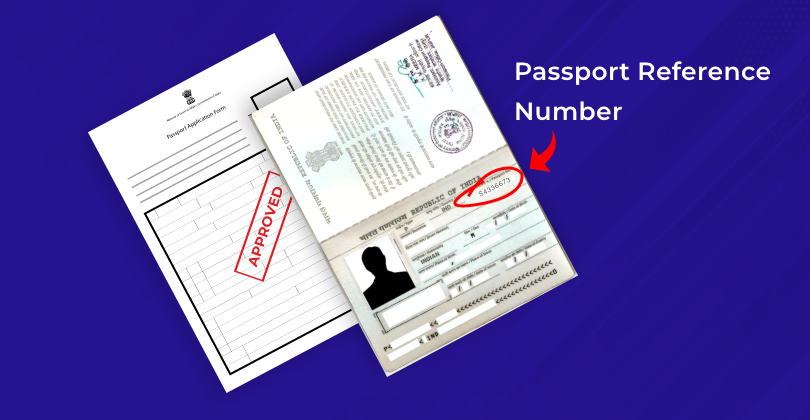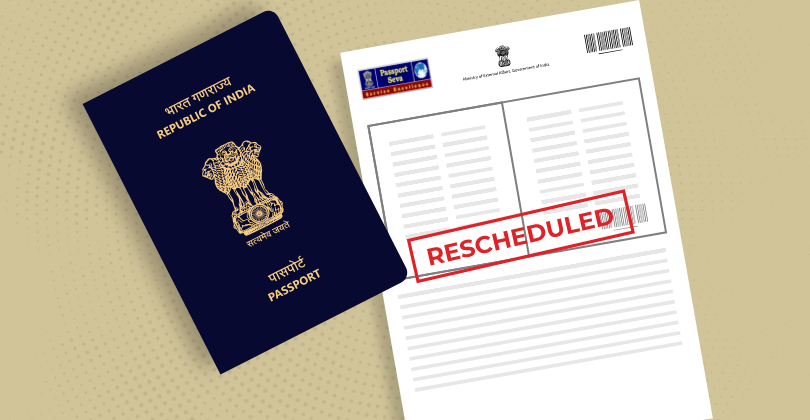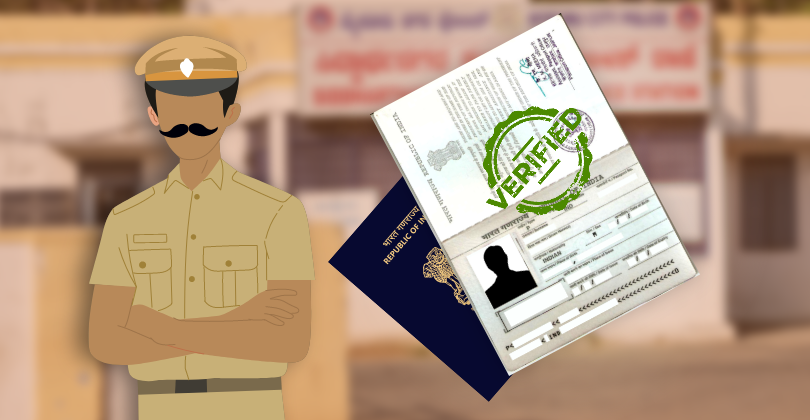Do you need to travel abroad suddenly but don't have a passport? This can be stressful, especially with the thorough passport application process. Luckily, there's
Did you know there are different types of passports in India? Each type serves a unique purpose. The passports are distinguished by their cover colours. This makes it easy to identify their specific uses.
Understanding the types of passports can help you choose the right one. Whether you're planning a trip, work assignment, or diplomatic mission, knowing which passport to apply for is crucial.
So, how many types of passports in India are there? What are the differences between them? Let's dive in and learn about the different types of passports in India!
Detailed Breakdown of Types of Passports in India
There are different types of passports in India, each serving a specific purpose.
Blue Passport for Common Citizens
The blue passport, also known as Type P, is the ordinary passport issued to India's general population. It is blue in colour to differentiate it from other official passports. This passport is issued to Indian citizens and is typically used for leisure, business, or educational trips abroad.
Uses
-
Travel for leisure
-
Business trips
-
Book an appointment at the closest Passport Seva Kendra and pay the feeEducational purposes
Benefits
-
Distinguishes general travellers from government officials
-
Helps foreign authorities identify the passport holder's status
Details
-
Processing Time:Generally 30 to 45 days
-
Tatkaal Passport: Available within a few days for urgent needs. Requires additional documents and fees
-
Short Validity Passport (SVP): Another option for urgent needs with shorter validity.
For most Indian citizens venturing overseas, this particular passport is the key to unlocking the world. Understanding its uses and benefits empowers you to make an informed decision and embark on your international journey with confidence.
Maroon Passport for Diplomats
The maroon passport, also known as the Diplomatic passport, is issued to Indian diplomats and high-ranking government officials. It is maroon in color to signify its distinct status and importance.
Uses
-
Diplomatic missions
-
International negotiations
-
Official state visits
Benefits
-
Grants diplomatic immunity and privileges.
-
Facilitates smoother interactions with foreign governments.
Details
-
Issued by the Ministry of External Affairs.
-
Valid for the duration of the official’s service period.
-
Requires special authorisation and documentation.
White Passport for Government Officials
The white passport, also known as the Official passport, is issued to Indian government officials traveling abroad on official duty. It is white in color to distinguish it from other types of passports.
Uses
-
Official government business
-
Participation in international conferences
-
Representing India in official capacities
Benefits
-
Recognised as an official travel document for government business
-
Helps in gaining access to official venues and events
Details
-
Processing time depends on the urgency and nature of the official assignment
-
Valid only for the duration of the official's assignment abroad
-
Requires authorisation from relevant government departments
These different types of passports ensure that every category of traveler, from ordinary citizens to government officials and diplomats, can travel internationally with the appropriate documentation and privileges.
White Passport for Indian Government Officials
The white passport, also known as Type S, is issued to Indian government officials. These officials use white passports for official travel outside India. It includes officers from the IAS and the Indian Police Service Department.
Uses
-
Official government travel abroad.
Benefits
-
Identifies government officials easily
-
Facilitates smoother processing by immigration officials
Details
-
Issued to IAS and Police Service officials
-
Differentiates white passport from ordinary passports to signify official status
This passport ensures that government officials are recognised and treated appropriately during international travel.
Maroon Passport for Diplomats
The maroon passport, also known as Type D, is issued to diplomats and eligible government officials. This passport is used for international travel and assignments. The maroon colour signifies the holder's high-ranking position and duty to represent India abroad.
Uses
-
Signifies diplomatic status
-
Grants special privileges and immunities under international laws
Benefits
-
Visa-free travel to many countries
-
Expedited processing at borders
-
Easier immigration procedures compared to regular passports
Details
-
Issued to Indian diplomats, Members of Parliament, Union Council of Ministers, and high-ranking government officials
-
Facilitates diplomatic missions and international relations
The maroon passport is a powerful tool for those representing India on international stages. It ensures they receive the necessary privileges and expedited services.
Orange Passport for Less Educated Citizens
The orange passport, also known as the Emigration Check Required (ECR) passport, is designed for less educated citizens. The Indian government introduced it in 2018 to help protect these individuals when they travel abroad for work.
Uses
-
For individuals without education beyond class 10
-
Required for travel to certain countries needing emigration clearance
Benefits
-
Ensures safety and protection from exploitation abroad
-
Speeds up the emigration clearance process
Details
-
Does not include an address page
-
Required for countries like UAE, Saudi Arabia, Qatar, Oman, and others, under the Indian Emigration Act of 1983
-
Helps immigration officers identify and process these travellers quickly
The orange passport is essential for those needing extra protection and verification when travelling abroad. It ensures that less educated citizens can travel safely and efficiently.
Requirements for Passport Types in India
Here is a breakdown of the requirements for different types of Indian passports:
| Passport Type | Eligibility |
|---|---|
| Personal Passport |
Any Indian citizen can apply. This includes:
|
| Diplomatic Passport |
Eligible applicants include:
|
| Emigration Passport |
Eligible applicants include:
|
| Official Service Passport |
Eligible applicants include:
|
| Passport Type | Eligibility |
|---|---|
| Personal Passport |
Any Indian citizen can apply. This includes:
|
| Diplomatic Passport |
Eligible applicants include:
|
| Emigration Passport |
Eligible applicants include:
|
| Official Service Passport |
Eligible applicants include:
|
Having knowledge of these requirements can help you determine which type of passport in India you are eligible for and ensure you have the correct documents when applying.
Choosing the Right Passport for Your Travel Needs
Knowing the different passport types in India empowers you to pick the perfect fit for your travel goals. From leisure trips to business ventures, official deployments, or even emigration, there's a specific passport designed for each purpose. Ensure a seamless travel experience by checking your eligibility and applying for the right type. Planning a trip but worried about expenses? Consider a travel loan or a personal loan for travel. KreditBee offers 100% online services, loans starting from ₹3,000 to ₹5 lakh, 24x7 personal loans on mobile, and hassle-free documentation.
Frequently Asked Questions
The best passport in India depends on your travel needs:
-
Regular (Navy Blue Passport): Ideal for most travelers for leisure, business, or personal trips.
-
Diplomatic Passport (Maroon): Issued to diplomats and high-ranking government officials on official travel. Offers visa-free entry to many countries and additional privileges.
-
Official Passport (White): Issued to government officials on official business abroad. Provides visa exemptions and diplomatic courtesies in some countries.
Yes, India offers VIP passports in two categories:
-
Diplomatic Passport (Maroon): Issued to diplomats, ambassadors, and other high-ranking representatives of India abroad.
-
Official Passport (White): Issued to government officials undertaking official travel overseas.
As of June 2024, Indian passport holders can travel visa-free to over 62 countries. This list includes popular tourist destinations like:
- Mauritius
- Maldives
- Bhutan
- Nepal
- Thailand
- Indonesia
- Fiji
India doesn't currently offer a "golden passport" program for direct citizenship purchase. However, there is a program granting Citizenship by Investment (CIP). This program allows wealthy foreign investors to obtain Indian citizenship through significant investments in the country.
The Indian government is constantly working to improve the country's passport ranking and visa-free access. The number of visa-free destinations for Indian passport holders has been steadily increasing, and this trend is expected to continue in the future.
Yes, Indian Administrative Service (IAS) officers are eligible for white passports for official travel abroad. These passports offer them special privileges and visa exemptions in certain countries.
The white passport holds the most power in India. It signifies the holder's high-ranking government position and grants them special privileges during international travel.
AUTHOR
KreditBee As a market leader in the Fintech industry, we strive to bring you the best information to help you manage finances better. These blogs aim to make complicated monetary matters a whole lot simpler.







